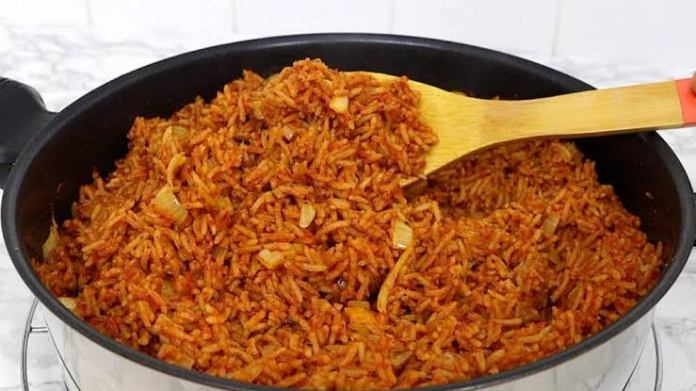Ghana Vs Nigerian Jollof has been the topic sensation for a while now! Jollof rice, the ultimate African culinary masterpiece, has long been a source of passionate debate and rivalry between two West African giants: Ghana and Nigeria. The battle for Jollof supremacy has raged on for years, igniting heated arguments at dinner tables, parties, and even on social media. But today, my friends, we embark on a quest to finally settle the age-old question: Ghanaian Jollof or Nigerian Jollof – which is truly better?
First, let’s set the stage for this epic showdown. Picture yourself at a lively African gathering, the air filled with tantalizing aromas that make your taste buds tingle with excitement. On one side, you have the Ghanaian Jollof, beautifully infused with aromatic spices, tomatoes, onions, and perfectly cooked grains of rice. It boasts a distinct flavor profile, often referred to as “party Jollof,” thanks to its popularity at celebrations. Ghanaians take great pride in their Jollof, and rightly so!
On the other side, we have the Nigerian Jollof, bold and vibrant, with a fiery red hue that captures your attention from the moment it’s placed before you. Bursting with flavors from a medley of peppers, onions, and tomatoes, Nigerian Jollof is known for its smoky and slightly spicy kick. Nigerians claim that their Jollof is the real deal, the true taste of perfection!

Similar Articles For You
How To Make The Perfect Suya Wrap By Kiki Foods
5 Kinds Of Food That Help Breast Growth
9 secret tips to make sour food absolutely delicious
But let’s not forget the essence of this battle—it’s not just about the flavors; it’s about the culture, the traditions, and the love poured into each pot of Jollof rice. The friendly rivalry between Ghana and Nigeria has become a symbol of unity within diversity, showcasing the vibrant culinary heritage of Africa.
Imagine a culinary Olympics where Ghanaian and Nigerian chefs face off in a Jollof cook-off. The tension is palpable, the atmosphere electric. The judges, an international panel of food enthusiasts, take their seats, ready to crown the ultimate Jollof champion. As the chefs scramble around their kitchens, they engage in a friendly banter, each confident in their ability to create Jollof rice that will make mouths water and hearts sing.

The moment of truth arrives. The judges take their first bite, their eyes widening with delight. The flavors dance on their tongues, and they nod approvingly, unsure of which team to support. The tension rises as they debate among themselves, knowing that the decision they make will shape the destiny of Jollof lovers everywhere.
And then, a unanimous verdict is reached! The judges rise to their feet, their faces beaming with joy. In a surprising twist, they declare it a tie! Ghanaian Jollof and Nigerian Jollof, both unique and exceptional in their own ways, have won the hearts and taste buds of the judges. The crowd erupts in applause, and the chefs embrace, putting an end to the Jollof war once and for all.

As the dust settles, we realize that the true victory lies not in determining a winner but in celebrating the diversity and richness of African cuisine. Ghanaian Jollof and Nigerian Jollof are more than just dishes; they are symbols of unity, love, and pride in our heritage.
So, let us raise our spoons in harmony, enjoying every delectable grain of Jollof rice. Whether you lean towards the flavors of Ghana or the fiery embrace of Nigeria, remember that in the end, we are all winners, united by our love for Jollof.
Let’s end the Jollof war and embrace the beauty of both culinary traditions. Ghanaian Jollof and Nigerian Jollof, hand in hand, have the power to bring people together, to spark conversations, and to create unforgettable memories.
Why not gather around the communal table, sharing stories, laughter, and delicious plates of Jollof rice. Let us appreciate the subtle nuances of Ghanaian Jollof, with its well-balanced spices and comforting flavors, and savor the boldness of Nigerian Jollof, with its fiery kick that leaves us craving for more.
As we take a bite, let us acknowledge the hard work and dedication that goes into preparing these culinary delights. The hours spent in the kitchen, the secret family recipes passed down through generations, and the unwavering commitment to perfection. It is this passion that has elevated Jollof rice to a level of culinary artistry, captivating taste buds and winning hearts worldwide.

In the end, it is not about choosing a side or declaring a winner. It is about appreciating the diverse tapestry of flavors that make up the African culinary landscape. Each country’s version tells a unique story, reflecting the history, traditions, and creativity of its people.















